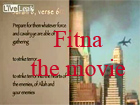« What Liberal Slant In The Media? | Main | Iraq's FM: al-Qaeda Exploiting U.S. Disunity Over War »
April 29, 2007
Ofra Haza - The Greatest Israeli Singer That Ever Lived
She is said to have bridged the divide between Israel and Arab countries - and has been called the greatest singer in the last century!
Ofra Haza (Hebrew: עפרה חזה) November 19, 1957 - February 23, 2000) was a popular Israeli singer, actress and international recording artist.Here is Ofra Haza singing Kaddish - the Jewish mourner's prayer.
Of Yemenite Jewish ancestry, Haza was born the youngest of nine children in the poor Tel Aviv neighborhood of Hatikvah. She became an instant local and then national success story, the subject of great pride for many Israelis of Yemenite origin.
Her voice has been described as mezzo-soprano, of near-flawless tonal quality, capable of lending itself to a variety of musical styles with apparent ease. It is thought likely that Haza's voice had the most upper harmonic overtones of any singer in history, reaching as many as 32 on some songs (edit - the great Yma Sumac could sing just 5) , such as "Love Song" from the album Shaday (1988) - see video clip below.
Inspired by a love of her Yemenite-Jewish culture, the appeal of her musical art quickly spread to a wider Middle Eastern audience, somehow bridging the divide between Israel and the Arab countries.
For salvation, Kaddish,
For redemption, Kaddish,
For forgiveness, Kaddish,
For health, Kaddish,
For all the wars victims, Kaddish,
For all the holocaust victims, Kaddish
Here Ofra Haza sings "Middle East" - Rome Olympic Stadium (1993)
In my Promised Land
In the Middle East
What will we do about terrorism?
In my Promised Land
In the Middle East
What can we do about fanaticism?
You and I on parallel lines
You and I, we are the key
Dreams are not enough
To lead and guide us
To peace
In the Middle East
.. Flare lights, flowers, mothers, fathers,
Homeland, green fields and tears
Borders, rivers, desert, Dead Sea
We are the key
Flare lights, flowers, mothers, fathers,
Homeland, green fields and tears
Borders, rivers, desert, Dead Sea
When can we meet? (more).
Yerushalaim Shel Zahav (Jerusalem of Gold)
Ofra Haza at Montreux Jazz Festival in 1990. - Love Song
If only somehow, as Ofra Haza did with her singing - Arab and Jew could again learn to share something together besides hate!
Ofra Haza's greatest international recognition came with the single "Im Nin Alu", taken from the album Shaday. Here she sings it at the Montreux Jazz Festival in 1990.
Remembering Ofra Haza
By Eric Silver, Mideast Correspondent
It is hard to write dispassionately about Ofra Haza, the Israeli pop icon who died last week at 41. She sang her fusion of Yemenite folk and '80s beat with intense, unabashed emotion. And she generated emotion in others.
With her striking, Middle Eastern beauty, she was the sister every Israeli would like to have had: talented, warm, spontaneous, unspoiled. She was a cliché -- the ninth child of poor Yemenite immigrants, a star who made it from the back streets of South Tel Aviv to Hollywood, then came home. But she transcended the cliché.
Ofra was Israel's pop star laureate. Her fans spanned generations and ethnic divides. She was chosen to sing in Oslo when Yitzhak Rabin, Shimon Peres and Yasser Arafat received the Nobel Peace Prize. She sang again at the memorial concert after Rabin's assassination. Ehud Barak and Bibi Netanyahu paid public tribute after her death. Peres eulogized her at the graveside.
Her 13 days in intensive care were a national drama. Television cameras hovered at the Tel-Hashomer hospital. Every change (or non-change) in her condition was reported on the hour. Admirers recited psalms. A bearded elder delivered an herbal cure. A Yemenite rabbi changed the mezuzah on the door of the emergency ward. Channel 1 television broke into an international basketball match to announce her death.
She was well enough to walk into the hospital, but soon lapsed into a coma. At her request and that of her family, the doctors declined to identify her illness. Until Monday, the media respected her privacy, though the country was awash with rumors. Then Ran Reznick, Ha'aretz's well-connected medical correspondent, broke the taboo. She was infected with the HIV virus and succumbed to AIDS-related complications.
I interviewed her a year ago at her home in Herzliya, north of Tel-Aviv. She sat in the long, narrow living room listening to her own soundtrack recording of the lament Yocheved, Moses' mother, sang as she launched the infant lawgiver into the bulrushes in Steven Spielberg's "The Prince of Egypt".
The stereo was blaring disco-loud. Tensed in a cozy chair beneath half a dozen golden discs, Ofra -- tiny, dark and lean as a waif -- shut her eyes tightly, swayed to the music and rubbed both arms as if her life depended on it.
"I'm shivering," she said. "I have goose bumps, and I feel like 'Wow!' Immediately I'm in the story. I'm sweating, I'm sad. The first time I saw the movie, I cried. You forget you're seeing an animated movie. When Yocheved puts Moses in the river, there is fear in her heart. It's so real. When you listen to the song, it means something unbelievable. I cannot avoid it. I can listen a thousand times, and again I feel the power of it."
In another singer, that might be have been dismissed as hype. In Ofra it rang true. Although she boasted five international albums, a Grammy nomination and placed second in the 1983 Eurovision song contest, there was still something artless about her. She giggled in mock-dismay when reminded of her first hit, "Ani Frecha" ("I'm a Bimbo").
For the Moses movie, she recorded Yocheved's song in 14 languages. She demonstrated half a dozen for me -- in German, Greek, Spanish, Polish, Hungarian and Portuguese -- from a crib sheet written in Hebrew script. The film's director had given her a doll to hold while she sang. She had no children of her own, but was eager for a family after marrying for the first time only two years before her death.
She had lived abroad, in California and Germany. She spoke five languages -- Hebrew, English, German, French and Italian. She had recorded with the Sisters of Mercy, Paul Anka and Iggy Pop. She sang, in Hebrew, for another recent film, "The Governess."
Ofra rejoiced in her success, but the joy owed more to wonder than vanity. She thanked God, with an easy, inherited piety. "All the time," she said, "I see in front of my eyes my parents who educated me to appreciate what God gave me. You know, I came from a poor neighborhood. We were five children in one bed. I never slept in a bed of my own. Then suddenly I'm staying in first-class hotels, driving in limousines, flying first-class. Every day I say 'Shema Yisrael' and thank God for giving me this opportunity."
She was, she conceded, more traditional than observant. She lit candles on Shabbat. On her travels abroad, she wouldn't eat non-kosher meat. She tried to avoid Friday night bookings. But she did drive on Shabbat.
"I don't know what I would have done without believing in God," she said. "His support gives me power and energy to continue to be optimistic, to smile, not to be depressed. Sometimes, if things are not going so well, I don't cry. I say maybe it's meant to be."
Her house, where she greeted me in jeans and sweat shirt, had a paddock with sleek black horses and a couple of Shetland ponies. There was a billiard table in the living room, modern Israeli paintings on the walls. But she insisted that she felt closer than ever to her parents.
"I understand them," she explained. "I understand where they came from, what their lifestyle was there. But my parents didn't push us to be like them. They said do whatever you think right, but remember the important things in life."
For 13 long days and nights, Ofra's parents, brothers and sisters mounted a vigil outside the Tel-Hashomer emergency ward. When they packed up and went home last Wednesday night, we didn't have to wait for the hospital spokesman to tell us she had gone.
Lyrics to love song ...
SIMENI KAHOTAM AL LIBECHA'
(set me as a seal upon your heart)
SIMENI KAHOTAM AL ZROECHA'
(as a seal upon your arm)
KI AZAH KA'MAVET AHAVAH
(for love is strong as death)
KASHAH KISHOL KINA'AH
(passion fierce as the grave)
RESHFHA RESHPE YESH
(its flashes are flashes of fire)
ESH SHALHEVET YAH
(a raging flame)
MAYIM RABIM LO YUCHLU
(Many waters cannot quench love)
LECHABOT ET HA'AHAVAH
(neither can floods drown it)
VUNEHAROT LO YISHTEFUHA
(if one offered for love)
IM-YITEN EYSH
(all the wealth of one's house)
ET KOL-HON BEYTO BA'AHAVAH
(it would be utterly scorned)
BOZ YAVUZU LO
(Shir HaShirim 8:6,7)
Cross posted from Hyscience
Posted by Richard at April 29, 2007 11:48 AM


